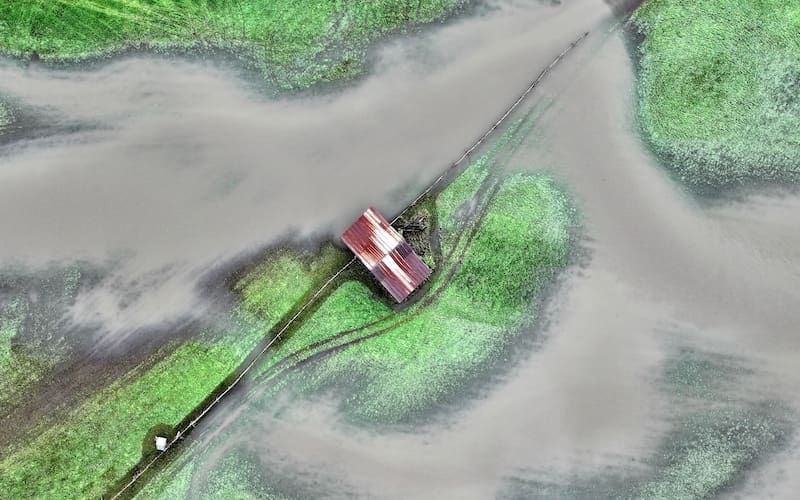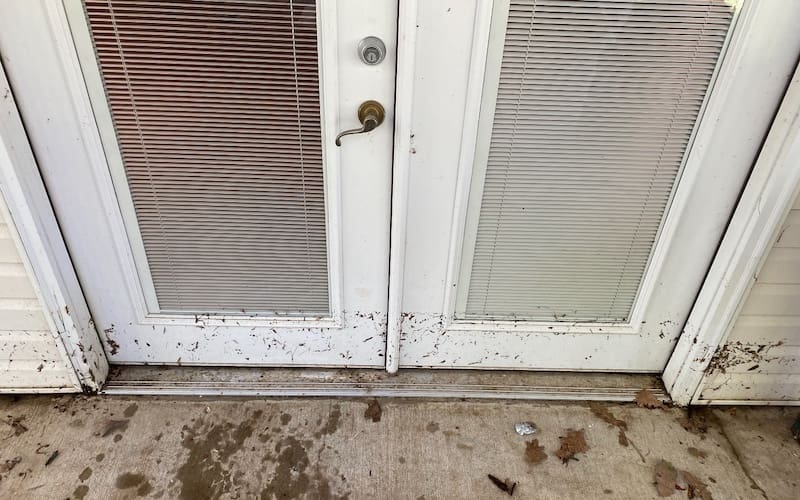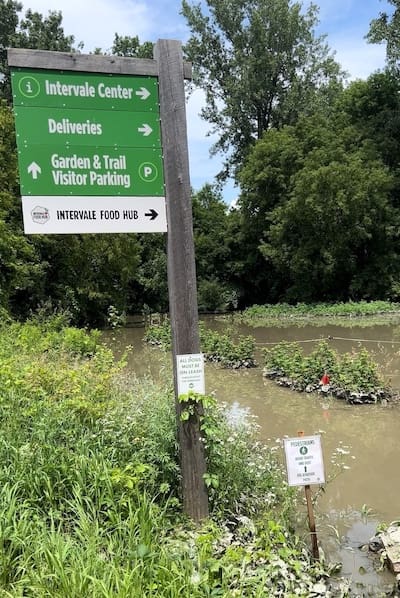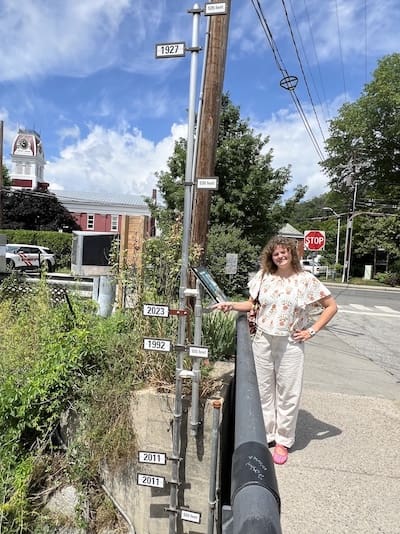
An overhead view of a house and field engulfed by flood waters in Vermont in July 2023 is a snapshot of the heartbreaking toll of flooding. Photo: Shutterstock
Editor’s update: Two days after this piece first appeared, for a third year in a row, Vermont towns were hit by flash flooding following heavy rains in July.
One day, a few years ago, the rain began, and it didn’t stop. A torrent of rain flooded the creek that ran up to my parents’ property in Fayetteville, Arkansas, and we could do nothing but watch as the water inched closer. The skies had dumped a historic eight and a half inches of rain in mere days, almost four times as much as we expected in a month. They claimed the storm was a freak accident, a “100-year storm.” But it happened again a year later.
My brother and I lived in the basement at the time of the first flood. I remember it vividly. The rain hadn’t started yet, but the sky rolled with thunder and lightning. In the middle of the night, I woke with a sick feeling in the pit of my stomach. I didn’t know why; my house had never flooded before, but I gathered my belongings from the floor – my backpack, my laptop, several stuffed animals, and an ottoman – and fell asleep with them on my bed. The next morning, I stepped down from my bed into two inches of water.
The sandbags my parents had placed around the basement door couldn’t handle this quantity of water. Overnight, the water rose to almost four inches. It took months after that – months of renovations and dread in my stomach every time it so much as sprinkled – for the basement to be habitable again.

A few months later, I thought we were in the clear. You don’t expect your life to turn upside-down again so soon. But in April of 2022, it happened again. Six inches of rain fell in 24 hours, less than a year after the first flood damaged my home and community. In the fall of that year, I moved to Vermont for college.

What happened next seems unimaginable. In the summers of 2023 and 2024, Vermont was hit by devastating floods. I was there. Once again, I found myself cleaning up after an “unprecedented” storm. This would be my fifth. It is the new climate paradigm in which we live. The floods last week in Central Texas are yet another example. “Once in a lifetime” storms are hitting the same communities over and over again, forcing us to reconsider what the new normal is. My story is just one example of why we need laws that acknowledge and address the mounting threat of climate change.
New Home, Same Story
I was serving with the Vermont Youth Conservation Corps Farm and Food program when the July 11, 2024, floods hit. Once again, I felt heartbroken and lost; while our crops and chickens escaped relatively unscathed, polluted water left from the flooding rendered several of the neighboring farms’ crops completely unsalable. Months of hard work and a season’s earnings, gone in a day.
Within a day, the National Weather Service received over 700 reports of flood-related damage in Vermont alone. The flooding devastated Vermont everywhere, from downtown Montpelier and Burlington to rural Newport to farmland in Richmond. From the 2024 flood alone, farms across Vermont sustained over $5 million in combined damages across 89 farms. The bulk of the impact fell on small farms, especially those that had already suffered a lost crop the season before, during the July 2023 flooding. Oftentimes, small farms are prepared to lose part of a season’s crop – but complete crop loss two years in a row can put a small farm out of business.

What was amazing to me was the community that rallied around these affected farms. The next day, July 12, Intervale Farms in Burlington asked for volunteers to help save any unsullied crops and try to reduce the damage caused by the flooding. Hundreds of people gathered at the farm, working tirelessly to try and save what we could. It was hard to keep going after pulling ruined vegetables from the soil, but we had each other to lean on. I was taken back to the first time my house flooded. Though most of my memories are of stepping into the floodwater, losing my belongings, and the nightmares after, I also remember my neighbors – some of whom I had never met – gathering in my basement to help bring my furniture upstairs.
Flooding is a Climate Change Issue
The science is clear. Increasing carbon pollution is causing warmer weather; we can only anticipate more of these devastating flooding events in the coming years. Regions across the U.S. – from Montpelier, Vermont, to Fayetteville, Arkansas – will continue to experience the severe and unfortunate effects of extreme flooding. We will continue to endure economic devastation for small businesses and communities, unhoused populations, and social services. We will also see environmental devastation and pollution as a result of extreme flash flooding, and the emotional trauma from the repeated suffering brought about by these floods.
As the anniversary of the July 11, 2023, and 2024 floods approaches, I can’t help but wonder if history will repeat itself for a third time. But while we can’t stop the flooding itself, we can educate ourselves and advocate for effective strategies to manage and respond to it. Through my time working with the Lake Champlain Lakekeeper at CLF, I have had the opportunity to inform Vermonters about conditions that may lead to extreme flooding events, such as the continued impacts of global warming, and to teach Vermonters how to protect themselves, their homes, and their communities in the face of extreme weather events. I’ve had an opportunity, too, to talk about Vermont’s new Flood Safety Act, which, if implemented, will reduce the likelihood of future flooding by lessening the costs of flood damage, enhancing river corridors, and safeguarding waterways.

Flooding is a climate change issue. The Climate Superfund Act, which CLF helped push and was passed in May 2024, would hold high-polluting fossil fuel companies accountable for billions of tons of harmful carbon emissions that drive global temperatures higher and cause extreme storms. However, the Trump Department of Justice wants to block the enforcement of climate superfund laws. The result would be irreparable harm to our communities while polluters get off scot-free. They pollute; we suffer. Vermonters must push for accountability. After all, these costly and frequent storms will continue to happen. We get to decide who will pay for the damages: us, or them.
This past May, my house in Arkansas flooded again. That means I have experienced the devastation of six floods in fewer than six years. This time, though, instead of feeling powerless, I feel motivated to make a change. I’ve learned that with the power of our collective action, we can compel legislators to prioritize people over money. We know that these storms will continue to rock our communities – we must prepare for the extreme weather that is not only coming but is already here. We are not alone in dealing with these issues – from Fayetteville, Arkansas, to Burlington, Vermont, to Central Texas, our voices can create change in our communities.
Avery Redfern is a University of Vermont student working as a CLF Lake Champlain Lakekeeper this summer.



